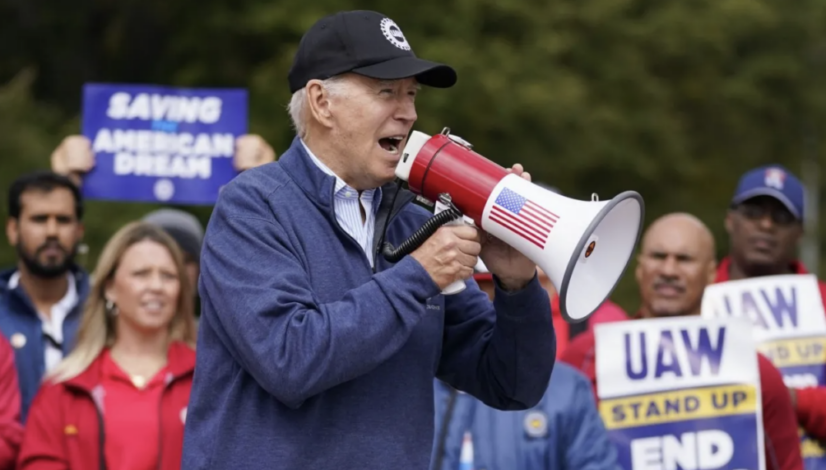Biden’s union pandering sets him on a collision course with EV promises he can’t keep

What does the UAW really want?
They want Detroit’s Big Three to guarantee their members’ jobs. They want reassurance that President Biden was telling the truth when he promised that jobs lost in coal mining or oil drilling or assembling gasoline-powered Chevys because of his green agenda will be more than made up by jobs making solar panels and batteries.
The problem is, Detroit’s automakers cannot make that promise. Indeed, Joe Biden cannot make that promise either.
Already GM and Ford are building battery plants in right-to-work states like Tennessee, hoping to lower their costs. True, they are also planning to manufacture in Ohio and Michigan — states where their workers will likely join the UAW. But they cannot compete with a coming flood of cheap Chinese-made electric vehicles if they pay union wages throughout their supply chain. Already, carmakers are losing money making EVs. If they grant UAW demands for huge pay hikes and other benefits, their costs will skyrocket.
This is a difficult situation for all parties, brought on by Biden’s edict that 67 percent of all cars sold in the U.S. by 2032 must be all-electric. The truth is, Americans are not ready to transition so quickly to electric cars. They see inadequate infrastructure and high prices as near-term obstacles. Further complicating the shift is the probable reliance on Chinese materials to meet EV goals and an electric grid that may not be adequate to the increased demand that will accompany rising EV usage.
Maybe it’s time to slam the brakes on Biden’s green agenda. After all, the president, who is struggling with disastrous approval ratings across the board, isn’t even getting favorable polls on his handling of climate change.
He wouldn’t be the only western leader who has decided that climate change activism has gone too far. UK’s prime minister, Rishi Sunak, just announced a five-year postponement of his country’s ban on sales of gas-powered automobiles, arguing that forcing the British public to go 100 percent electric would “impose unacceptable costs on hard-pressed British families.” Sunak also warned that the headlong rush to green energy in his country risks “losing the consent of the British people.”
Will Joe Biden come to the same conclusion? Doubtful. The president’s commitment to his climate agenda seems as ironclad as it is destructive.
Voters link his ongoing war on fossil fuels to rising gasoline prices, which are again clobbering his polls. Even as prices at the pump rise, Biden forbids drilling on yet more acreage and otherwise seems intent on discouraging U.S. oil and gas investment. His stubbornness is politically bewildering.
Yesterday, Biden traveled to Michigan to join the UAW picket lines. The White House pretends that UAW leadership implored the president to come — it’s not true. Sean Fain, UAW president, invited “everyone who supports our cause…from our friends and families all the way up to the president of the United States” to join their walk-out; Joe Biden, bleeding support from every traditional Democrat-aligned group, jumped at the chance.
The president told striking workers “You deserve a significant raise.” He also, foolishly, told the picketers to “stick with it” and shouted “Yes” when asked if the UAW should get a 40 percent raise. That enthusiasm could come back to bite him. If the strike goes on, the economy — already a weak point for the president — will suffer.
Nobody thinks the car companies can give a 40 percent pay increase without torching their own futures. In addition, such an increase would likely help kick off a wage-price spiral, guaranteed to keep inflation above the Federal Reserve’s 2 percent target. It will be interesting to watch the White House try to talk that back.
Still, for all the cheerleading, Biden is ignoring the elephant in the room. The fight is not over wages and hours worked, though that is part of it — the real fight is over jobs that will be lost as Detroit accedes to Biden’s climate agenda and pivots to making more electric-only vehicles, which require 40 percent less labor to produce than internal-combustion engines.
That’s why Sean Fain lashed out at President Biden this past spring, after the White House approved a $9.2 billion loan to help Ford and its South Korean partner build three battery plants in right-to-work states Kentucky and Tennessee. “Why is Joe Biden’s administration facilitating this corporate greed with taxpayer money?”
Ford, which had also planned a battery facility in Michigan, has just recently put that project on hold. Media reports suggest that some in Congress were concerned that Ford’s partner in the project had ties to the Chinese Communist Party.
Could it also be that Ford’s decision was a thinly veiled warning to the UAW? Managements’ explanation for the construction stoppage hints at the possible costs of producing in Michigan: “We’re pausing work and limiting spending on construction on the Marshall project until we’re confident about our ability to competitively operate the plant,” a spokesman said in a statement. What does that mean? Are they suggesting that building in Michigan and having to pay union wages will make the batteries too costly compared to those made in Tennessee?
That’s how Sean Fain seems to have read Ford’s decision, blasting on Twitter that the pause is a “barely-veiled threat by Ford to cut jobs.” Fain says the UAW is “simply asking for a just transition to electric vehicles.”
What he means by “just transition” is that car makers agree to hire only union labor in their plants, no matter where they are located. UAW’s president wants the Detroit Big Three to guarantee union members won’t lose their jobs.
Operating plants in right-to-work states does not guarantee that the UAW will be unable to organize the workforce. They have that right. But it is a risk that union leadership is unwilling to take. They want guarantees, not probabilities — guarantees no one can give.




